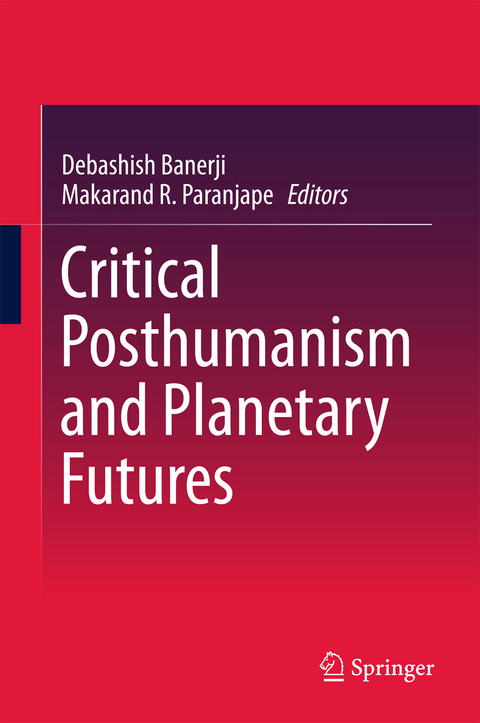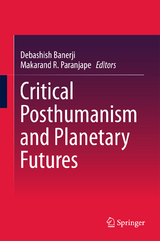Critical Posthumanism and Planetary Futures
Springer, India, Private Ltd (Verlag)
978-81-322-3635-1 (ISBN)
Debashish Banerji is Haridas Chaudhuri Professor of Indian Philosophies and Cultures and Doshi Professor of Asian Art at the California Institute of Integral Studies, San Francisco. He has curated a number of exhibitions on Indian and Japanese Art and has written extensively on philosophy, art history, culture studies, postcolonialism and posthumanism. He is the author of The Alternate Nation of Abanindranath Tagore (SAGE, 2010) and Seven Quartets of Becoming: A Transformative Yoga Psychology Based on the Diaries of Sri Aurobindo (DKPW, 2012). Makarand R. Paranjape is Professor of English at Centre for English Studies, School of Language, Literature and Culture Studies, Jawaharlal Nehru University, New Delhi. He served as the inaugural Indian Council for Cultural Relations (ICCR) Chair in Indian Studies at the National University of Singapore (2010–11). His recent publications include Making India: Colonialism, National Culture, and theAfterlife of Indian English Authority (2013); Another Canon: Indian Texts and Traditions in English (2010); and Altered Destinations: Self, Society and Nation in India (2009). He is the Principal Investigator of an internationally funded project on “Science and Spirituality in India.”
Chapter 1. The Critical Turn in Posthumanism and Postcolonial Interventions Debashish Banerji and Makarand Paranjpe.- Part I: Critical Theory: The Posthuman Turn.- Chapter 2. “Posthuman Critical Theory” Rosi Braidotti.- Chapter 3. “The Overhuman” Nandita Biswas Mellamphy.- Chapter 4. “Nietzsche’s Snowden: Tightrope Walking the Posthuman Dispositif” Richard Carlson.- Chapter 5. “Exits to the Posthuman Future: Dreaming with Drones” Arthur Kroker and Marilouise Kroker.- Chapter 6. “‘Synthetik Love Lasts Forever’: Sex Dolls and the (Post?)Human Condition” Prayag Ray.- Part II: Subalternity and Posthumanism.- Chapter 7. “Posthumanism: Through the Postcolonial Lens” Monirul Islam<.- Chapter 8. Two Senses of the Post in Posthuman” Pal Ahluwalia.- Chapter 9. “Information-power: Teletechnology and the Ethics of Human-Animal Difference” Samrat Sengupta.- Chapter 10. “Durga, Supermom, and the Posthuman Mother India” Sucharita Sarkar.- Chapter 11. “Beyond the Mother-machine: Surrogacy and Neo-eugenics in India” Amrita Pande.- Part III: Reconstructions.- Chapter 12. “P2P and Planetary Futures” Jose Ramos, Michel Bauwens and Vasilis Kostakis.- Chapter 13. “Decolonizing the State of Nature: Notes on Political Animism” Federico Luisetti.- Chapter 14. “Spiritual Pragmatics: New Pathways of Transformation for the Posthuman” Ananta Kumar Giri.- Chapter 15. “Have Humans Always Been Posthuman: A Spiritual Genealogy of the Posthuman” Francesca Ferrando.- Chapter 16. “Individuation, Cosmogenesis and Technology: Sri Aurobindo and Gilbert Simondon” Debashish Banerji.
| Erscheinungsdatum | 26.10.2016 |
|---|---|
| Zusatzinfo | 1 Illustrations, black and white; XIII, 277 p. 1 illus. |
| Verlagsort | New Delhi |
| Sprache | englisch |
| Maße | 155 x 235 mm |
| Themenwelt | Geisteswissenschaften ► Philosophie ► Ethik |
| Geisteswissenschaften ► Philosophie ► Metaphysik / Ontologie | |
| Naturwissenschaften | |
| Sozialwissenschaften ► Soziologie ► Allgemeine Soziologie | |
| Schlagworte | Changing conceptions of the body • Commodity culture • Cyborg building • Cyborg city • Human body as information • Neo-eugenics in India • New understanding of the state of nature • Politics of maternity, machine and monstrosity • Postcolonialism • posthumanism • Posthumanism and utopia • Posthumanist colonial practices • Posthuman mother • Postmodernism • Surrogacy • Technicity • Techno-colonialism • Technological vitalism |
| ISBN-10 | 81-322-3635-1 / 8132236351 |
| ISBN-13 | 978-81-322-3635-1 / 9788132236351 |
| Zustand | Neuware |
| Informationen gemäß Produktsicherheitsverordnung (GPSR) | |
| Haben Sie eine Frage zum Produkt? |
aus dem Bereich




